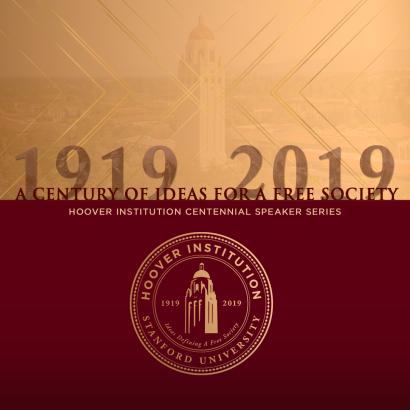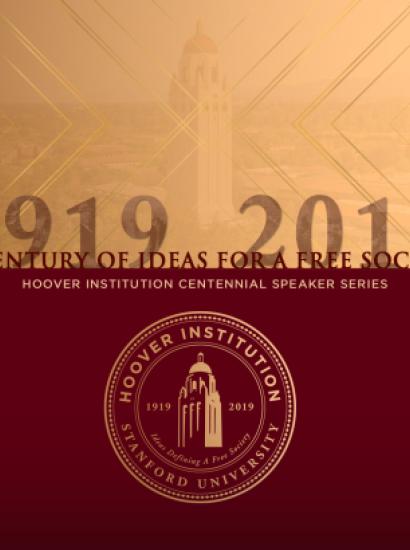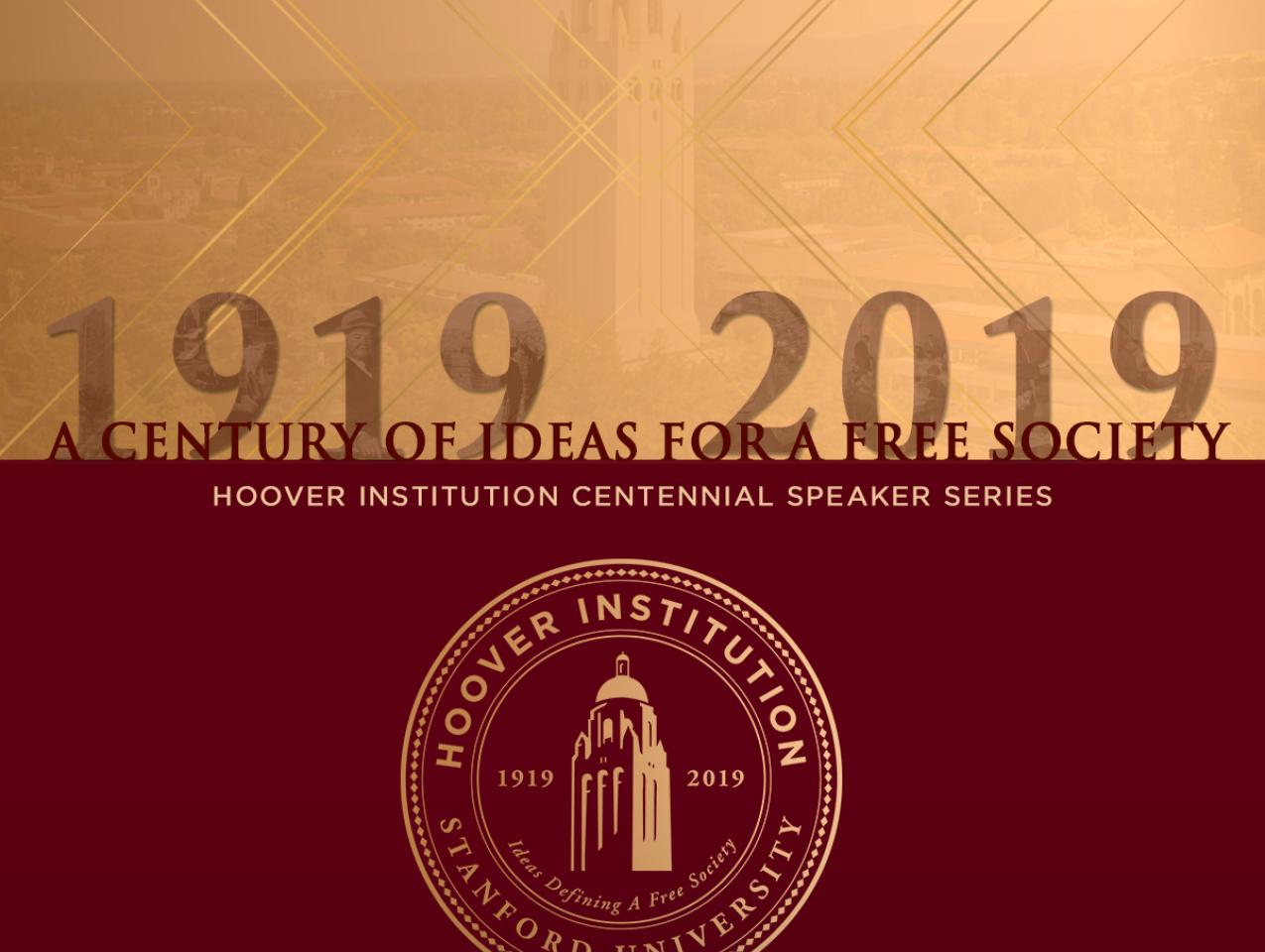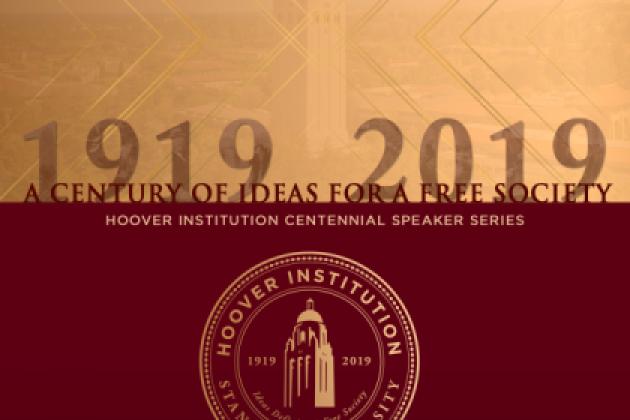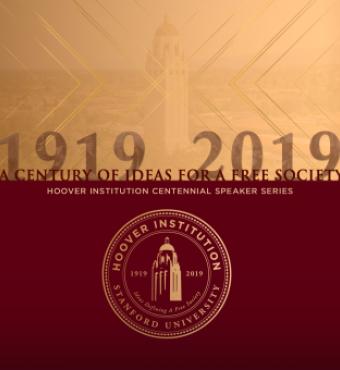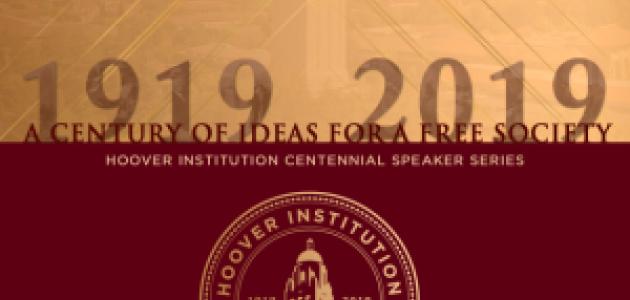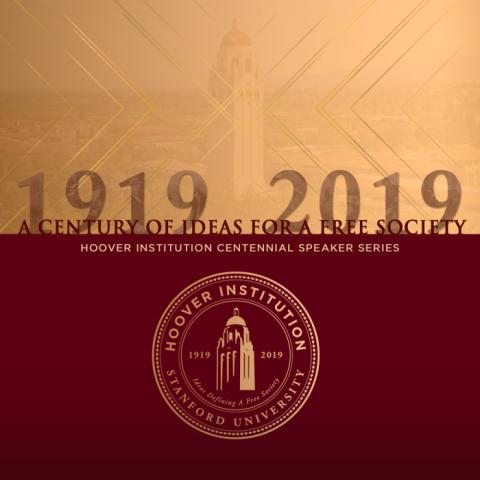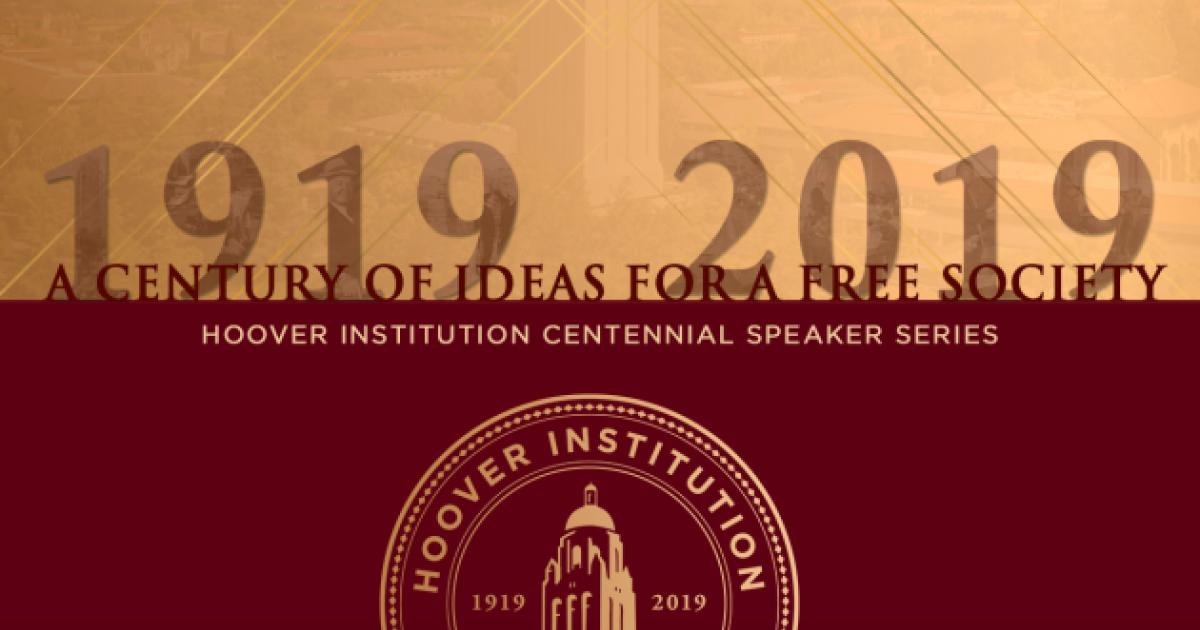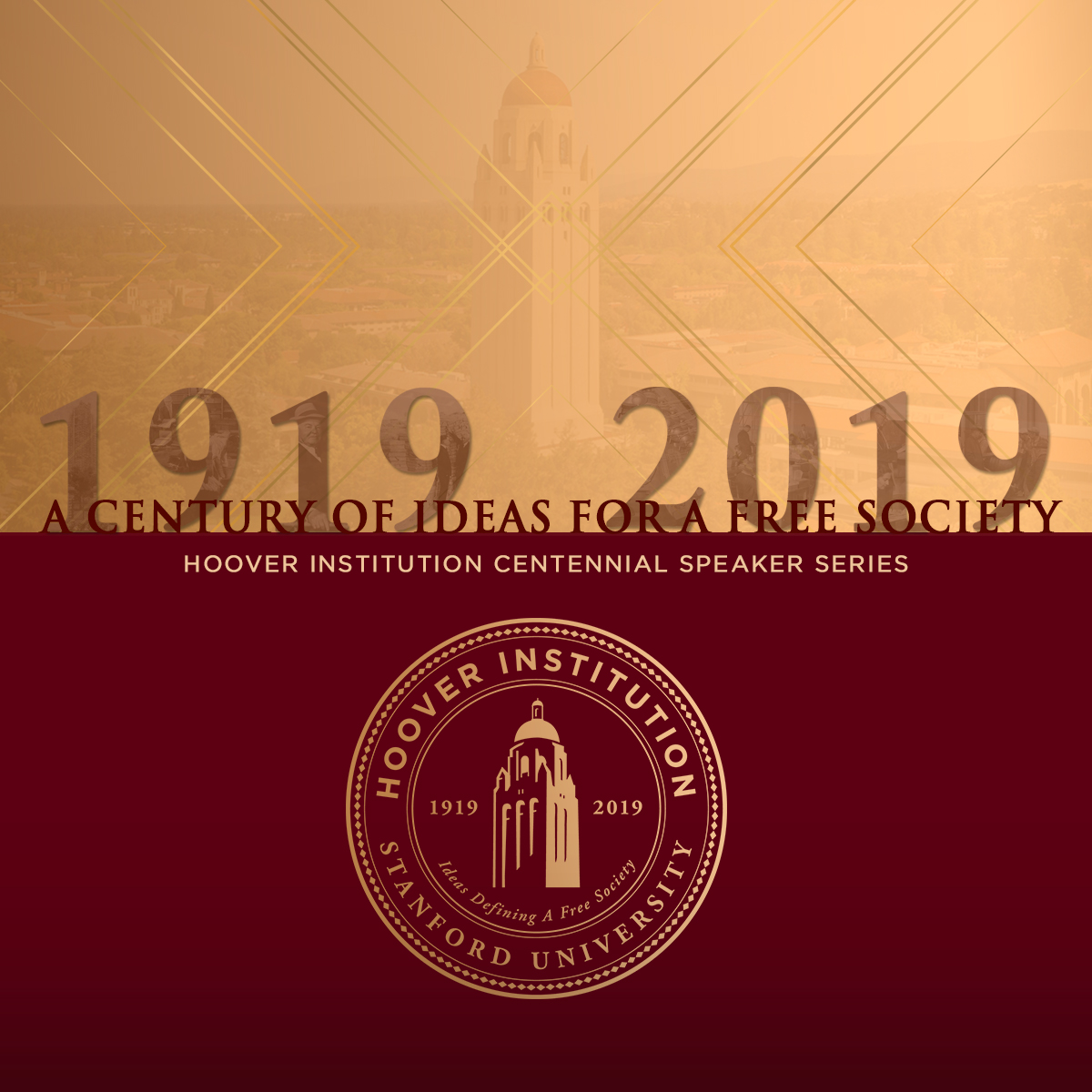
To commemorate its centennial, the Hoover Institution will offer a lecture series, A Century of Ideas for a Free Society, that starts in March and continues through the end of 2019.
The panel discussions will feature Hoover fellows examining the most critical issues facing America and the world. The topics reflect the values of the Hoover Institution—individual, economic, and political freedom; private enterprise; limited, effective representative government; and an understanding of the nature of war, revolution, and peace.
A Century of Ideas for a Free Society lectures will be held in Hauck Auditorium. Each is set to begin at 4:30 p.m. and end at 6 p.m., followed by a reception with light refreshments in the Traitel Pavilion. Tickets are free – click here for information about tickets.
Below are confirmed dates and speakers:
MARCH 26
One Hundred Years of Democracy and Foreign Policy, with Condoleezza Rice, Niall Ferguson, and Stephen Krasner
The United States was founded on the principles of life, liberty, and the pursuit of happiness, and for decades, support for democracy around the world has been a central tenet of American foreign policy. The past century provides many examples of prosperity experienced by thriving democracies, balanced against the instability of authoritarian and repressive regimes. This panel discussion will address the changing role of democracy building in America’s foreign policy over the past century.
APRIL 18
A Century of Prosperity: Improvements in the Standard of Living, 1919 vs. 2019, with Terry Anderson, John F. Cogan, Lee Ohanian, and George P. Shultz
The past century has witnessed dramatic improvements in the standard of living in the United States. Panelists will discuss the role that free markets, property rights, innovation, regulation and national security have played in this remarkable advancement in human well-being.
MAY 20
Technology, Innovation, and the Future of the US Economy, with Stephen Haber, Edward Lazear, and Amit Seru
This session will discuss the sources of prosperity in the United States over the past century and will look at its drivers over the next century. Panelists will also address the ongoing debate about the impact of artificial intelligence and robotics on standards of living and the sets of relevant facts and data to consider.
JUNE 4
The Battleground of Perception: Countering Threats to Free and Open Societies, with Larry Diamond, Niall Ferguson, and H. R. McMaster
Repression and authoritarianism are not merely phenomena of the historical past. Today we are engaged in a fundamental battle of free and open societies against repressive, closed systems. This panel will address the nature of such threats and discuss the identities of freedom’s adversaries, their goals and strategies, and what can be done to defeat these threats across government, the private sector, academia, and civil society.
JULY 18
The Big Three: Roosevelt, Stalin, and Churchill during the Second World War, with David Kennedy, Stephen Kotkin, Andrew Roberts, and Peter M. Robinson
During the Second World War, president Franklin Roosevelt, premier Joseph Stalin, and prime minister Winston Churchill exchanged hundreds of cable messages and held two summit meetings coordinating the vast Allied effort to defeat Nazi Germany and Imperial Japan. Panelists will discuss why the peaceful new international order that the three agreed to establish after the conflict turned instead into the Cold War.
AUGUST 20
Changing the Education Debate, with Eric Hanushek, Terry M. Moe, and Margaret Raymond
Hoover scholars have been heavily involved in far-reaching educational research, and their work provides surprisingly positive answers to thorny questions, such as whether scholarship has ever influenced the debate on educational policy; whether new policies are just about politics without regard to fact; and how to mitigate bad ideas by introducing good ideas through research and analysis.
SEPTEMBER 24*
New Regional Orders and New Ways of War: Europe, the Middle East, and Asia, with Michael McFaul, Abbas Milani, and Gary Roughead
The global order of the past seven decades is being disrupted by regional dynamics. Powers of the past are reasserting themselves—Russia in Europe and the Middle East, Turkey and Iran in the Middle East, and China in Asia and beyond. Technology is changing how nations can prosper, influence, and compel. The panel will discuss what these changes portend for each of these regions and the US role in shaping events in its national interest.
*UPDATED WITH NEW DATE.
OCTOBER 2
Tax and Monetary Reform: From Ideas to Actions over One Hundred Years with Jennifer Burns, Robert E. Hall, and John B. Taylor
Hoover Institution economists have generated many ideas on tax and monetary reform over the years, from the Friedman rule and government spending limits to the Hall-Rabushka flat tax and the Taylor rule. Panelists will discuss the origination of such ideas, how they have been applied in practice in the United States and other countries, and the future of such reform-oriented policy.
NOVEMBER 4
Hoover’s One Hundred Years of War, Revolution, and Peace, with Niall Ferguson and Victor Davis Hanson
Historians Niall Ferguson and Victor Davis Hanson will discuss the seminal events of the last century—the two World Wars, the Great Depression, the rise and fall of Soviet communism, and the advent of modernism and globalization—and how Hoover Institution scholars, informed by the lessons of history, have interpreted these tragedies and challenges.
NOVEMBER 19
Labor and Capital Market Policy: From Ideas to Actions over One Hundred Years, with John Cochrane, Caroline M. Hoxby, and George P. Shultz
Nowhere are good economic ideas more important for growth and stability than in labor and capital markets. Enormous technological, political, and demographic shifts in the past one hundred years have changed what is feasible and what works in practice. Panelists will discuss how ideas about the roles of government and private enterprise have changed, how good ideas stressing economic freedom can be advanced into action, and the influence of globalization on the ability of governments to apply good ideas to capital flows and immigration.
History, Hoover Fellows
Hoover’s core strength is its fellows, who produce influential works that directly address the major policy challenges facing our nation and world. The fellows are an interdisciplinary group of humanists, political and social scientists, and natural scientists who study economics, education, energy, foreign affairs, health care, history, law, national security, and politics. Their fundamental mission and the spirit of their enterprise is encapsulated in the Hoover Institution’s official slogan, Ideas defining a free society.
Hoover director Tom Gilligan talked last year about Hoover’s centennial on Research Fellow Bill Whalen’s Area 45 podcast.
“We started as a library set up by then citizen Herbert Hoover in order to gather papers that explored the causes of war,” he said. “What are the predicates of peace? How do societies, free societies, govern themselves in ways that avoid conflict? That remains a focus of the Hoover Institution today. We continue to host thousands of researchers every year to uncover knowledge about the causes of war.”
Gilligan described the centennial as a “yearlong celebration of lifting up our values to as many people as we possibly can.” For example, Hoover is recasting its strategic plan to answer the questions, What do we want to be in our second century? What do we want to aspire to? What we want to do? We want to apply the values of the Hoover Institution to research that informs public policy.
The director noted that Hoover will spread this message to policy makers in Washington, DC, and the states as well as the general public. “The occasion of our centennial celebration affords us the opportunity to remind everybody what our values are. How durable they are. How they can take flight in current public-policy debates.”
Media Contacts
Clifton B. Parker, Hoover Institution: 650-498-5204, cbparker@stanford.edu







